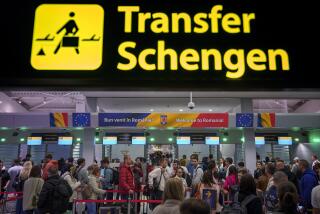European Union Opens Way for Ex-Foes, but Not Turkey
- Share via
LUXEMBOURG — The European Union flung open its doors Saturday to former enemies in Eastern Europe but steadfastly blocked the entry of its longtime NATO ally, Turkey.
Calling it “a moment of historic significance,” the 15 EU leaders ended a two-day summit with invitations to Poland, Hungary, the Czech Republic, Slovenia, Estonia and Cyprus to begin membership negotiations and offered a slower track to Romania, Latvia, Bulgaria, Lithuania and Slovakia.
EU leaders also declared their single currency firmly on track after they narrowly avoided a split over how to coordinate economic policies when they switch to euro-money a year from now.
The potentially damaging currency dispute pitted the 11 nations expected to adopt the euro against the four likely to keep their national currencies.
All 11 would-be EU members will participate in a March 30 kickoff meeting in London. Then, the first six will start detailed membership talks while the EU will open “preparatory talks” with the rest to address some of the economic and political problems holding them back.
Turkey, on the other hand, was turned away.
Unable to overcome serious human rights problems, solve its territorial dispute with Greece or come to grips with myriad economic difficulties, Ankara was not even deemed ready for a spot on the second team.
To mollify the Turks, EU leaders invited them to a “European Conference,” essentially annual summits involving EU members and the 11 declared candidates. The gesture failed to excite Ankara, and its acceptance of the deal was in doubt.
Getting the new members into the union will involve $84 billion in economic aid, grants and loans in the 2000-06 period to help the aspirants come up to EU standards.
None of the prospective members are expected to be ready to join for at least four or five years, some much longer.
More to Read
Sign up for Essential California
The most important California stories and recommendations in your inbox every morning.
You may occasionally receive promotional content from the Los Angeles Times.













